
Vegetarianism cannot possibly fix our environment, but it’s the easiest and most effective commitment an individual can make. Gidon Eshel, a geophysicist, and Pamela Martin, an assistant professor of geophysics at the University of Chicago, state that “if Americans were to reduce meat consumption by just 20 percent it would be as if we all switched from a standard sedan — a Camry, say — to the ultra-efficient Prius.”
By reducing consumption of meat or abstaining from it entirely, an individual reduces water pollution caused by the cattle and their waste reservoirs and air pollution caused by both the cattle’s’ carbon and methane emissions and the transportation of the meat.
Over seventy percent of the grain grown in the country is used to fuel feedlots. Meat could be considered a weak investment in food production as they are very inefficient. It takes sixteen pounds of grain to grow—let’s admit it, you can hardly call it farming or raising, anymore—one pound of meat. It takes five pounds of wild fish to grow one pound of salmon (and an inferior salmon, at that!). “According to the USDA and the United Nations, using an acre of land to raise cattle for slaughter yields 20 pounds of usable protein. That same acre would yield 356 pounds of protein if soybeans were grown instead”[sic]more than 17 times as much!”
Imaging what we could do with all the grain, land, and water we’d save if we just committed to spending a little more time on dinner—if we just brought ethics to the table.
It’s cheaper to grab a burger and fries on your way home, but it shouldn’t be. Government subsidies favor corn and wheat (both used heavily on feedlots) so they can be sold below production costs and fruit and vegetable farmers aren’t united enough to even ask for government subsidy. If we were to reduce the amount of money given to grain and corn farmers, we could reduce the cost of produce—and supply nutritious food for the poor — and increase the price of “junk food” and meat.
The health of all would be better if more people had better diets. I found it interesting that by reducing our meat consumption by 20% could have such a huge impact on the environment. The title does a good job of building curiosity about the blog making the reader want to read on. Although most of us should eat better, with the convenience of fast food that is most likely not going to happen. People are becoming more dependent of having things quickly and fast food is a fix to those running low on time. In an article,
ReplyDelete“Fast-Food Nation: The True Cost Of America's Diet”, done by Eric Schlosser, a National Magazine Award winner, (http://www.kosmix.com/topic/Eric_Schlosser) he shares that “Americans now spend more money on fast food than they do on higher education, personal computers, software or new cars. They spend more on fast food than on movies, books, magazines, newspapers, videos and recorded music - combined.” (http://www.mcspotlight.org/media/press/rollingstone1.html) The change needs to start in the fast food industry; it has become a significant part of our lives. Countless individuals work at and for fast food companies. McDonalds alone “trains more new workers than the U.S. Army [annually]”. If there were changes to the fast food industry to make their products healthier it would have a greater impact on society as a whole. This would gradually open people up to changing their diet and possibly consuming less meat or more meat alternatives.